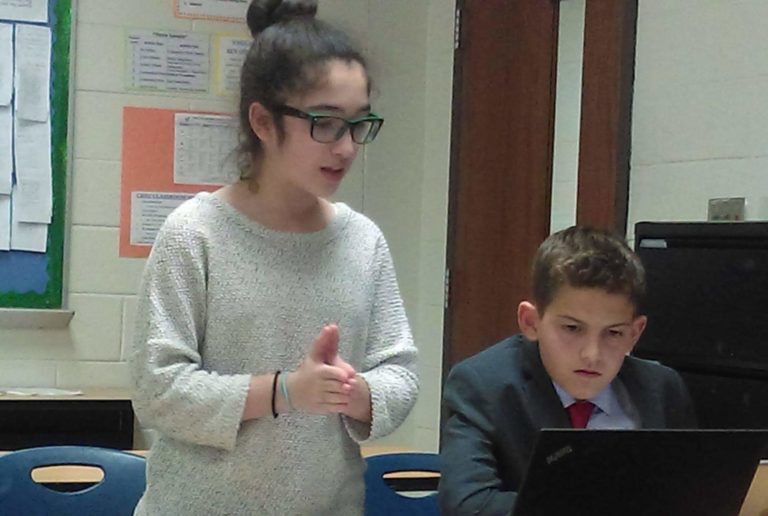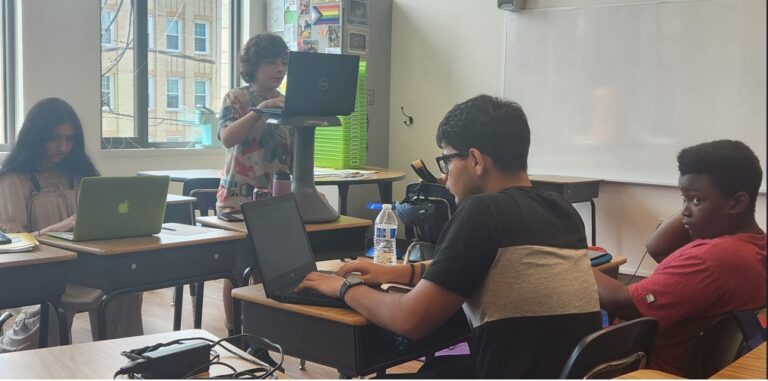Our Impact
Peer reviewed research shows that policy debate is one of the best things a student in middle and high school can do with their time, and it's 1/3 the cost of comparable interventions like high impact tutoring.

Students enjoy the competition and intellectual community, but its impact stretches much further. Debate teaches students how to analyze, explore and understand the world around them, and builds portable skills like research, critical thinking, and communication that are in demand for 21st century careers, and are hard to outsource or automate. The skills and persistence developed through debate directly benefit their academic life and their success in college.
Urban Debate gets results across all significant student achievement metrics, and students continue to improve their outcomes every semester they participate. The research on Urban Debate is comprehensive and compensates for selection bias, comparing urban debaters to non-debaters peers instead of the general student population.

Academics
Accordion Content

Urban Debaters improve their GPAs every semester they participate. The average Urban Debater’s GPA is above the national college readiness benchmark (3.23 GPA), while their non-debater peers are not (2.83), and (0.66) over non-debater peers.
Anderson and Mezuk, (2015), Mezuk and Ko (2021), Mezuk (2009)

While extracurricular participation negatively correlates to standardized test scores, Urban Debaters score higher, and higher than their non-debater peers across the board.
On the ACT:
+15% Reading
+15% English
+10% Math
+ 27% Science
On the SAT
+52 points (Math)
+57 point (Reading/Writing)
A year of debate is 1.68 years of ELA growth
Anderson and Mezuk (2015), Kalesnikava, Ekey, Ko, Shackelford, and Mezuk (2019), Mezuk and Ko (2021), Scheuler and Larned (2023), Noonan (2011), R.J. (2002) Scheuler and Larned (2023), Mezuk (2009)

Urban Debaters score 14% higher on literacy exams than their non-debater peers.
78% of debaters improved their reading comprehension
Female urban debaters exceeded national norms in reading, 1.5-2 years ahead of schedule
Minneapolis Public Schools Research, Evaluation, Assessment and Accountability Department 2015-2016 Report, Littlefield (2001) Shackelford (2019), Zorwick and Wade (2016), Winkler, Fortner, and Baugh-Harris (2013)

For every debate round a student participates in, they attend one more day of school. and are less likely to be involved in disciplinary incidents than their non-debater peers. New data from MNUDL shows that Urban Debaters have 66-77% better attendance than their peers in school.
Female urban debaters were half as likely to be tardy
Anderson and Mezuk, (2015), Minneapolis Public Schools Research, Evaluation, Assessment and Accountability Department 2015-2016 Report, Shackleford (2019), Winkler, Fortner, Baugh-Harris (2013), Shackelford (2019)

Urban Debaters are 70% more likely to graduate on time than their non-debater peers.
90% of Urban Debaters graduate on-time, including 75% of “at risk” students. For African American male debaters — debate increased their graduation rate by 29%
100% of WUDL debaters graduate on time
Anderson and Mezuk (2015), Mezuk, Ekey, Shackelford, Ko, and Kalesnikava (2019), Akerman and Neale (2011), Mezuk (2009), Mezuk, Bondarenko, Smith, and Tucker (2011), Peters (2008)

Urban Debaters are 18% more likely to be college ready and more likely to attend highly selective institutions (HSI) than their peers.
College Attendance:
Urban Debaters: 68%
All Urban Schools: 63%
Majority/Minority Schools: 58%
Low Income Schools: 56%
+10% more likely to attend HSI than their peers.
Acceptance Rate Impacts
Debate Captains: +60%
Regional Winners: +22% – 30%
School Newspaper: +3%
Sports Captain: +5%
Class President: +5%
90% of NDT participants earned at least one advanced degree. Former debaters get advanced degrees 44% more often than non-debater peers
Ekey et al (2019), Luong (2000), Mezuk and Ko (2021), Matlon and Keele (1984), Rogers, Freeman, and Rennels (2002)
Social-Emotional
Accordion Content

Debaters are 3 times more likely to vote in elections and 2 times more likely to participate in social and political campaigns
Debate also reduces polarization and encourages citizens to consider evidence
98% of debaters report that debate improved their political awareness, and debaters are 40% more likely to discuss political and social issues with peers
Rogers, J.E. (2005), Anderson and Mezuk, (2015), Mirra, Honoroff, Elgendy, and Pietrzak (2016), Fishkin, Siu, Diamond, and Bradburn (2021), Gibbs, Erickson, Dufur, and Miles (2015), McDonald (2000), Bauschard, Coverstone, Rao, and Rao (2023), Chikeleze, Johnson, and Gibson (2018), Cronin (1990), Inoue and Nakano (2004), Littlefield (2001), McIntosh and Milam (2016), Medina (2020), Noonan (2011), Scott (2008), Zare and Othman (2013), Fishkin, Siu, Diamond, Bradburn (2021)

Debate strengthens students ability to persevere, focus, and struggle in the face of disappointment and defeat.
Fine (1999), Shackelford, Mezuk, Ekey, Ko, and Kalesnikava (2019)

87.5% of Urban Debaters analyze information better than their peers, and debaters are less likely than non-debaters to distort the truth or ignore conflicting evidence.
Debaters improve their reading scores by 25% more than non-debaters, and 18% more than honors students
Minneapolis Public Schools Research, Evaluation, Assessment and Accountability Department 2015-2016 Report, Rogers, J.E. (2005), Collier (2014), Bauschard and Rao (2015), Bauschard, Coverstone, Rao, and Rao (2023),

Participating in debate increases critical thinking skills by an average of 44%. Students who competed in debate performed better than students who took public speaking class on tests in skills of inference, recognition of assumptions, deduction, interpretation, and evaluation of arguments.
American college debaters demonstrate 27% improvement in analytical reasoning skills.
Allen, Berkowitz, Hunt, and Louden (1999), Chikeleze, Johnson, and Gibson (2018), Inoue and Nakano (2004), Medina (2020), Akerman and Neale (2011), Colbert (1986), Freeley and Steinberg (2009), Minch (2006)

Debate experience helps students interact with peers and authority figures, including across intercultural boundaries
Wade (1998), Freeley and Steinberg (2009), and O’Donnell (2009)

Debate reduces verbal aggression, increases assertiveness, and improves the communication skills (Analysis, Delivery, and Organization)
Corson (1987), Colbert (1993), Chikeleze, Johnson, and Gibson (2018), Allen, Berkowitz, Hunt, and Louden (1999), Kennedy (2007)

Urban Debaters, especially women, show 39% greater self esteem than non-debater peers.
Minneapolis Public Schools Research, Evaluation, Assessment and Accountability Department 2015-2016 Report, Winkler, C., Fortner, K., & Baugh-Harris, S. (2013), Billman (2008), Walker (2015), Freeley and Stienberg (2009), Goodwin (2003), Inoue and Nakano (2004), Luong (2003), Medina (2020),

Debate improves time management, study habits, and organization. Surveys show that “improvement in handling stress” is one of the top 5 benefits of participating in debate.
Littlefield, R. S. (2001), Winkler, Fortner, and Baugh-Harris (2013)

Debaters relate to others, express moderate views, are more inclined to join intercultural organizations, and increase their openness to the world and others.
Rogers, J.E. (2005), Semlak and Shield, (1977), Rennels, Rogers, and Freeman (2016), Minch (2006), Goodwin (2003)
